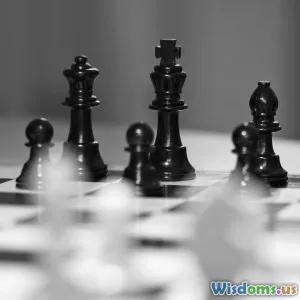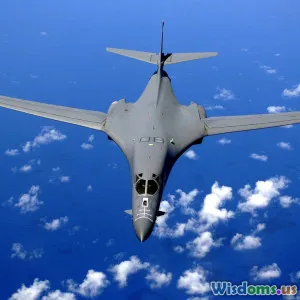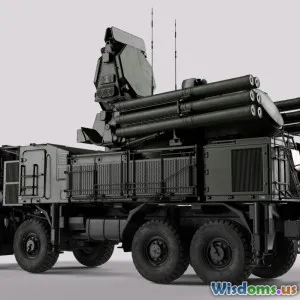
Are Quantum Computers the Future of Military Cyber Defense
8 min read Exploring how quantum computing could reshape military cyber defense with unprecedented capabilities and challenges. (0 Reviews)
Are Quantum Computers the Future of Military Cyber Defense?
In an age where cyber warfare increasingly shapes global security dynamics, the hunt for technological supremacy has entered a new phase: the quantum era. Quantum computers, heralded for their ability to perform complex calculations exponentially faster than classical machines, are rapidly transitioning from theoretical constructs to practical tools. But what implication does this quantum leap hold for military cyber defense?
Today, sovereign nations invest billions in cyber defense strategies aiming to thwart adversaries’ digital incursions. The emerging quantum technologies offer unprecedented capabilities, but also uncover vulnerabilities and ethical dilemmas that redefine traditional military defense paradigms. This exploration delves into whether quantum computers will become pivotal in the next generation of military cyber defense frameworks.
Understanding Quantum Computing Fundamentals
Quantum computers leverage the principles of quantum mechanics, such as superposition and entanglement, enabling them to process a vast combination of states simultaneously. Unlike classical bits which exist in binary 0 or 1 states, quantum bits (qubits) hold multifaceted states, exponentially increasing computational power.
Quantum Computing vs. Classical Computing
Classical computers excel at sequential and routine tasks but falter on certain complex problems—for example, factoring large numbers or simulating quantum systems. Quantum computers can dramatically accelerate these processes. For instance, Peter Shor's algorithm theoretically allows quantum machines to factor large integers significantly faster than the best classical algorithms, threatening the security of widely used encryption methods like RSA.
Current Military Cyber Defense Challenges
Modern militaries face an ever-evolving cyber threat landscape. Critical infrastructure, classified communications, and defense networks are prime targets for state-sponsored hacking, ransomware, and zero-day exploits. Traditional cryptographic techniques, while robust, rely on computational difficulty that quantum computers might break in the near future.
The U.S. Department of Defense has noted in its unclassified reports that state actors such as China and Russia actively develop advanced cyber capabilities. These functionalities could exploit weaknesses in cryptographic standards, potentially crippling defense communications or stealthily altering battlefield data information.
Quantum Computing's Promises for Military Cyber Defense
Quantum-Resistant Encryption: A Game Changer
With quantum computers threatening existing cryptography, developing quantum-resistant algorithms becomes paramount. Post-quantum cryptography (PQC) aims to secure data against both classical and quantum attacks. The National Institute of Standards and Technology (NIST) is currently leading efforts to standardize PQC algorithms anticipated for military application in the coming decade.
Enhanced Threat Detection and Response
Quantum machine learning models might process vast datasets much faster, enabling real-time anomaly detection in military networks. For example, quantum-enhanced cybersecurity platforms could identify subtle intrusion patterns invisible to classical systems, strengthening perimeter defenses.
Secure Quantum Communication
Quantum Key Distribution (QKD) uses quantum mechanics principles to share encryption keys with intrinsic eavesdropping detection. Militaries experimenting with QKD networks have shown proof-of-concept success, establishing secure communication channels resistant to all known hacking methods.
Real-World Efforts and Experiments
Several military organizations globally have already initiated quantum research programs:
- United States: DARPA’s Quantum Information Science program invests in practical quantum technologies for defense, including quantum cryptography and sensing.
- China: Deployed a quantum communication satellite 'Micius', enabling secure intercontinental quantum communication. China aims to build a quantum-secure military communications grid.
- European Union: The Quantum Flagship initiative supports defense projects exploring quantum-resistant encryption and network security infrastructures.
These investments reveal the strategic importance countries assign to maintaining technological edge in the quantum domain.
Challenges and Limitations
Though promising, quantum computers are not yet ready for full military cyber defense integration.
- Technological Maturity: Present-day quantum computers are noisy intermediate-scale quantum (NISQ) devices unable to consistently outperform classical counterparts for many defense applications.
- Resource Demands: Quantum systems require extreme conditions, such as ultra-cold temperatures and isolation from interference, complicating deployment in operational environments.
- Dual-Use Risks: Quantum technologies might empower offensive cyber operations alongside defense, escalating an arms race with unforeseen consequences.
Ethical and Strategic Considerations
Implementing quantum cyber defenses raises ethical questions such as:
- Who controls access to quantum technologies?
- How can proliferation risks be minimized?
- What legal frameworks govern the use of quantum-enhanced cyber weapons?
Strategically, countries must balance defense advancements with diplomatic engagement to prevent destabilizing conflicts driven by technological advantages.
The Future Outlook
Experts predict quantum supremacy—that is, surpassing classical capabilities—within the next decade. Military cyber defense will likely transform in response, adopting hybrid cryptographic architectures blending classical and quantum-safe solutions.
Continued research in quantum sensing, communication, and algorithms will drive new paradigms transcending conventional network defense models. Collaboration between governments, academia, and industry will be vital to harness potential while mitigating risks.
Conclusion: The Quantum Frontier in Military Cyber Defense
Quantum computers embody a revolutionary tool with profound implications for military cyber defense. By simultaneously posing threats to existing cryptographic foundations and offering enhanced security and detection mechanisms, they force a reevaluation of defense strategies.
While challenges exist—in technology readiness, implementation feasibility, and ethical governance—the momentum behind quantum research suggests it will become an indispensable element of future military cybersecurity infrastructures. Embracing quantum technologies prudently may provide the decisive edge essential for safeguarding national security in the increasingly complex digital battlefield.
In the fast-evolving cyber warfare landscape, ignoring the quantum revolution is not an option. Forward-thinking defense systems must prepare to integrate quantum computing innovations, turning a potential threat into a powerful ally.
References:
- National Institute of Standards and Technology (NIST) Post-Quantum Cryptography
- United States Department of Defense Cyber Strategy Reports
- DARPA Quantum Information Science Program Statements
- “Quantum Computation and Quantum Information” by Nielsen & Chuang
- China's Micius Satellite Quantum Communication Mission
- European Union Quantum Flagship Information
By understanding and anticipating the impact of quantum computing, military cyber defense can evolve from reactive protection to proactive dominance.
Rate the Post
User Reviews
Other posts in Cybersecurity
Popular Posts


















